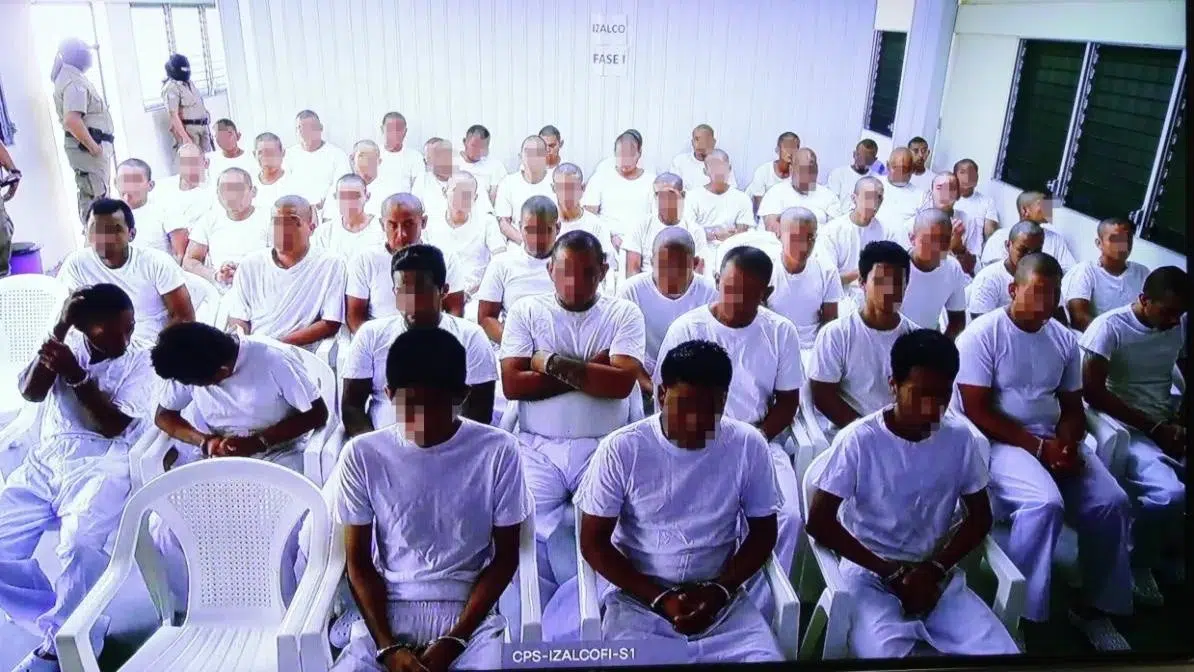The Movimiento de Víctimas del Régimen (MOVIR) voiced its concern on October 3 regarding how the mass trials will unfold under the state of exception and about the ongoing detentions.
“As MOVIR, we are concerned about the issue of mass trials. We are talking about groups that sometimes include 1,800 people, and the prosecution has to individualize their cases. Under the guiding principles of criminal and procedural law, the first formidable task facing the Attorney General’s Office is to individualize charges to ensure an accusation is valid. But what happens with 1,800 people? They say the hearings will last for months. That is what concerns us,” stated Félix López, a MOVIR spokesperson and the father of an arrested youth.
Various organizations also voiced concern over the shrinking civic space, the curbs on public information, and the right to protest. They also denounced the ongoing arrests and their opposition to the 43rd extension of the state of exception.
López said that families are worried because people detained under the state of exception are being “regrouped” together with gang members, and that this combination by the Attorney General’s Office is “prejudicing judicial authorities.” “They are handling them by cliques and territories and grouping them that way,” he said.
“A more exhaustive analysis would uphold the presumption of innocence for detainees. We at MOVIR continue to defend the innocent and insist on being given the opportunity to prove they are innocent,” López asserted.
Another concern López raised is that at hearings where families seek the imposition of precautionary measures, they present proof of community ties, but the public officials who receive the information begin telling them that such ties are unjustified because the young people “are not in a domestic partnership or married” and “do not own property,” nor have “formal employment.”
Closure of Civic Space
Journalist Leonel Herrera also addressed the shutdown of civic spaces and the restrictions on public information, along with violations of freedom of expression, the right to organize, to protest, and others.
“Among the restrictions I identify, the first is the state of exception, where time and events have shown it to be a mechanism for instilling fear and paralyzing society. It is a mechanism for bypassing due process and committing any abuse against any person. It is a mechanism that allows the government to operate above the law and evade accountability,” Herrera asserted.
He also highlighted a second restriction: the “blocking of access to public information,” which he considers an obstacle to the practice of journalism and the citizen’s right to obtain information.
During the forum, Herrera spoke about the exile of more than 40 journalists and the arrests of lawyers and human rights defenders in recent months.
MOVIR muestra preocupación por juicios masivos que podrían durar meses en El Salvador
El Movimiento de Víctimas del Régimen (MOVIR) mostró este 3 de octubre su preocupación sobre cómo se llevarán a cabo los juicios masivos en el marco del régimen de excepción y sobre las detenciones que aún siguen vigentes.
“Como MOVIR nos preocupa el tema de los juicios masivos. Estamos hablando que en ocasiones hay un grupo de 1,800 personas y (la Fiscalia) tiene que individualizarlos. Si nos vamos a los principios rectores del derecho penal y del procesal penal, la primera tarea fuerte que tiene la Fiscalía General de la República es individualizar para acusar y que esa acusación sea cierta. ¿Pero qué sucede con 1,800 personas? Hablan de que las audiencias van a durar meses. Eso es lo que nos preocupa a nosotros”, manifestó Félix López, vocero del MOVIR y padre de un joven capturado.
Distintas organizaciones manifestaron también su preocupación por las restricciones al espacio cívico, la restricción a la información pública y al derecho de protesta. Además denunciaron que las capturas siguen y que no están de acuerdo con la prórroga número 43 del régimen de excepción.
López dijo que las familias están preocupadas porque están “reagrupando” a las personas capturadas en el régimen junto a pandilleros y que esta combinación que hace la Fiscalía está “prejuiciando a los aplicadores de justicia”. “Los están manejando por clicas y canchas y así los agrupan”, dijo.
“Si tuviéramos el tiempo del análisis más exhaustivo, viéramos la presunción del privado de libertad. Nosotros como MOVIR seguimos defendiendo a los inocentes y seguimos insistiendo en que nos den la oportunidad de probar que son inocentes”, aseveró López.
Otra preocupación que mostró López es que en la audiencias que solicitan las familias para la imposición de medidas se presentan arraigos, pero que los servidores públicos que reciben la información comienzan a decirles que están injustificados porque los jóvenes “no están acompañados o casados” y “no tienen propiedades”, ni “trabajo formal”.
Cierre del espacio Cívico
El periodista Leonel Herrera habló también sobre los cierres de espacios cívicos y las restricciones a la información pública y las violaciones a la libertad de expresión, el derecho a la organización, a la protesta, entre otros.
Entre las restricciones que identifico, primero está el régimen de excepción donde el tiempo y los hechos han demostrado que es un mecanismo para generar miedo e inmovilizar a la sociedad. Es un mecanismo para saltarse el debido proceso y cometer cualquier abuso contra cualquier persona. Es un mecanismo que le permite al gobierno estar por encima de la legalidad y no rendir cuentas”, aseguró Herrera.
También destacó como segunda restricción el “bloqueo al acceso a la información pública” y que considera obstaculiza el ejercicio periodístico y el derecho del ciudadano a obtener información.
En el conversatorio Herrera habló del exilio de más de 40 periodistas y las capturas de abogados y defensores de derechos humanos de los últimos meses.

